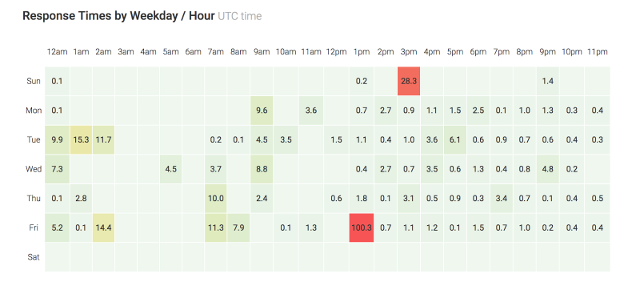
Blog > Cx excellence
What makes great customer support for SaaS companies?
Over the past 10 years, we’ve built and run support teams for around 100 SaaS companies around the world, like Vend, Biteable and KeyCDN. We knew how to deliver a good customer experience from day one, but we’ve spent every day since perfecting it. Here’s what we learned.
It’s well documented now that most if not all SaaS companies focus on customer success as part of their growth strategy. The best companies use low churn rates and targeted account revenue expansion to create negative churn rates. This means they can significantly increase revenue from their existing client base every year, compounding their overall growth rate.
But what makes great customer support? How high do you set the bar? Do you need to answer every support ticket immediately? How fast do you need to respond? What’s the best way to talk to a customer?
1. Respond in less than 2 hours (during work hours)
Customers who get a response in less than two hours are the most satisfied. But there are a few important things to keep in mind:
- Responses within two hours is good, but one hour is great
- This mainly applies during your customer’s working hours
After normal working hours though, it’s a different story. Have a look at this distribution of response times by hour of the day for one SaaS company:

Here, you can clearly see fast response times during the working week, and slower response times in the evenings.
Something to consider: some SaaS companies primarily sell to more executive employees, and these companies seem to have very few tickets on the weekends. Consumer SaaS apps, or SaaS companies with lower price points and who are selling to a relatively large number of customers, tend to have more tickets on the weekends and in the evenings.
How do you provide fast(er) response times? We help with 24/7 support for SaaS.
2. Focus on speed, not fluffy details
Almost all of the best performing help desks had a few small grammatical issues, usually around punctuation or tense. But what they did have was fast responses, with agents focussed on speed and resolving the core issue rather than perfect grammar.
This makes sense, as most SaaS customers are trying to figure out an immediate problem when they create a ticket. The primary focus should be on solving the problem as quickly as possible for the customer.
You also need to equip your agents with the a full picture of the user: the platform they are using, the product version they are on and account details. 7 in 10 consumers expect anyone they interact with to have the full context of their situation Zendesk. Don't waste time having frustrating exchanges trying to diagnose problems.
What you can do right now:
- Train for efficiency: Equip your team with training that emphasizes efficient problem-solving techniques, ensuring they can quickly identify and address the heart of a customer's issue.
- Implement a knowledgebase: Maintain a comprehensive, easily searchable internal knowledge base that agents can reference to find information quickly and reduce response times.
- Foster a culture of speed and accuracy: Celebrate and reward agents who consistently provide fast and effective solutions, reinforcing the value of speed combined with resolution quality.
3. Get to the point, but be polite
The most satisfied customers got responses that were clear, concise and got to the root of the problem quickly. There’s very little conversational padding. Almost all responses start with a quick hello and then start answering the question right away, telling the customer exactly what is happening and why.
Though the responses are succinct, almost all responses still have a simple closing statement such as ‘Hope this helps’ or ‘Let me know if I can help further’. Many of the lower performing help desks often fail to include a light closing statement.
What you can do right now:
- Directly address the inquiry: Quickly transition from your greeting to addressing the customer's concern. Use your understanding of the problem to provide a concise explanation or solution. This approach shows respect for the customer’s time.
- Focus on clarity: Ensure your response is straightforward and easy to understand. Avoid using technical jargon that might confuse the customer. If complex explanations are necessary, consider breaking them down into simpler terms or steps.
- Include a closing statement: Even with a focus on brevity, always end your responses with a courteous closing statement. This could be as simple as "Hope this helps!" or "Is there anything else I can assist you with?" It leaves the conversation open for further questions and makes the customer feel supported.
Here is an example:
Let's say a customer named Alex contacts your SaaS company with a concern about how to integrate your product with their existing software stack. Here’s an example response that follows the "Get to the point, but be polite" principle:
Subject: Quick Integration Guide for Your [Product] & Existing Software
Hi Alex,
Thanks for reaching out! To integrate [Your Product] with your current software, you'll want to start by accessing the 'Integrations' section in your dashboard. Here’s a quick step-by-step:
- Navigate to 'Settings' and select 'Integrations.'
- Choose the software you’re using from the list and click 'Connect.'
- Enter your login credentials for the software to authorize the integration.
This should have you set up in no time. I’ve attached a detailed guide to help you through the process. If you encounter any bumps along the way or have more questions, feel free to drop me a message. Hope this helps!
Warm regards,
[Your Name]
[Your Position]
[Your Contact Information]
So, What Do You Do Next?
If you’re building your support strategy from scratch or if you want to refine your support processes, you can start by doing the following:
- Ensure fast support response times during your working day
- Make sure your responses are concise but effective
- Optimize towards fast response time for 95% of tickets, not 100%
- Stay away from CSAT score as a support team effectiveness benchmark
And, don’t forget a simple but effective closing statement with your conversations.
Hope this helps! :)
Grow your business with SaaS customer support outsourcing
Influx provides consistently high-quality customer support for SaaS companies. Learn more about how we help SaaS companies with support. Find out more about how Influx can help your customer support operations with Support as a Service. Follow ourblog for more support experience research and updates.


 6 Circle - small.png)